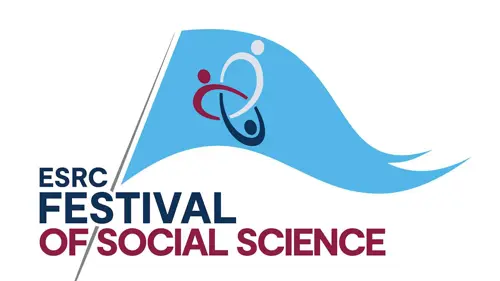Apply for up to £3,000 to run a public engagement event as part of the ESRC’s annual Festival of Social Science.
When does the Festival take place?
19 October – 9 November 2024
About the Festival
The Festival of Social Science takes place every Autumn and is a free celebration of the social sciences, delivered and run by higher education institutions across the UK.
This is a brilliant opportunity to engage public audiences and young people with social science research, and to increase awareness of its positive contribution to wellbeing, society, and the economy.
The Festival includes all types of events (talks, exhibitions, quizzes, performances, craft activities, debates, pop-up stalls.) and these can by physical events, online or hybrid. There is no cost to attend and most events are open to everyone (though some are aimed at specific groups).
Festival events should not be targeted at academic audiences (people attending an event because it relates to their work as a researcher or other university staff member, or in relation to undergraduate/postgraduate studies).
There is no set target number of attendees per event. Participatory events are very welcome and attendance numbers should be limited to what is practical and will ensure a good experience for attendees. We appreciate that some events targeted at hearer-to-reach attendees may not attract large numbers, but that engaging with a small group of people who wouldn’t normally attend a research-based or cultural event is in itself a success.
What is the 2024 theme?
Our Digital Lives.
Events on this theme can be on any aspect of the relationship between humans and digital technology. This could include (but is not limited to):
- Specific opportunities, benefits or threats to society, particular groups, or individuals from digital technologies and how we can take advantage of or tackle these.
- Teaching and developing digital skills for different groups and at different stages of life (for example in school, in the workplace, for older people)
- What life might look like in the future as a result of technological developments and how we feel about this.
Whilst priority will be given to events on this theme, other festival events on any economics/social science topics likely to be of interest to the target audiences for which they are designed will be considered.
How to apply
Please read the Festival Event Leader Pack and Event Leader job description before preparing a proposal for an event so that you understand the requirements for festival events.
The deadline to apply is 12pm, Wednesday 12 June 2024.

FAQs
Who can apply?
Applications are welcome from any researcher, regardless of career stage, including PhD students.
Applications are welcome from social scientists as well as researchers in disciplines outside the social sciences; however, to meet ESRC criteria there must be a social science component/collaborating partner for the event to be eligible.
What can I spend the budget on?
Costs could include, but are not limited to: marketing/comms, venue hire, event support, resources/equipment, travel for UK speakers/organisers/participants, and light refreshments.
Costs supporting capacity building, external support, transport to events where needed for those who might otherwise be unable to attend (for example bus hire for schools or transport costs for those from low-income backgrounds), and any type of engagement activities that directly support the festival objectives are acceptable.
The following costs are not supported:
- Salaried staff costs. However, we can pay hourly invoiceable/‘timesheet’ type costs, provided that an auditable trail is kept that shows why the costs are justifiable in terms of creating value for the public.*
- Alcohol, and substantial food and beverage offerings**. However, light refreshments such as tea, coffee, juice, and biscuits can be covered, as can costs for appropriate sustenance for volunteers. Up to date details of the maximum amounts that can be spent per person can be found in Annex B of the UKRI business expense claims, business travel and subsistence policy.
- Goody bags (for example containing promotional and/or novelty items) or substantial giveaways. However, modest value items where appropriate, such as prizes for a young people’s competition, or materials to allow event attendees to continue an activity at home, are OK.
- Travel costs for international speakers/participants.
- Accommodation costs only under exceptional circumstances. Please email SocialScienceImpact@rhul.ac.uk to discuss this.
*Payments for an individual’s time.
Examples of acceptable payments for an individual’s time include (but are not limited to):
- Paying someone for whom presenting is their career, e.g. a specialist STEM presenter to run a children’s event.
- Paying a student/postgrad for their time (e.g. a £100 payment or a book token), in return for helping out with a task relating to an event.
- Paying a freelancer to create a brochure or digital resource.
**Food and drink
Examples of acceptable food and beverage costs:
- Hot or cold non-alcoholic drinks for participants, event leaders or volunteers.
- Small snack items e.g. biscuits or fruit for participants, event leaders or volunteers.
- A light lunch e.g. sandwiches, crisps and fruit, for event leaders or volunteers (not participants) IF they are working all day at event and there’s no practical alternative.
Examples of food and beverage costs that aren’t permitted:
- Meals for event participants (including those provided as takeaways or buffets, e.g. pizzas, buffets of snack foods).
- Meals for event leaders or volunteers before or after events.
What do we mean by ‘public audiences’?
‘Public’ does not have to mean ‘open to and suitable for everyone.’ We encourage you to consider which particular segment of the ‘public’ your event should focus on and why, and tailor accordingly. The NCCPE has a useful guide to ‘Who are the public?’. The NCCPE has a useful guide to ‘Who are the public?’.
What training and support will be available if I am successful?
Online public engagement training will be provided by ESRC. It is a requirement that all event leads attend these sessions to deliver a festival event. If the event lead is unavailable for a session, they can nominate another member of their event team to attend in their place.
Emily Gow (Impact and Partnerships Manager) can also provide advice and guidance to run a successful event.
What events did Royal Holloway host in 2023 as part of the Festival?
Our 2023 events, under the theme 'Lifelong Wellbeing' included:
- Creating spaces of safety and belonging for Black and Asian young people. A film-showing and workshop held by Professor Anna Gupta.
- Is it a crime to Protest? A workshop held by Dr Matt Clement.
- Stories of Women in Academia. An online series of talks for young people, organised by Dr Amy Bonsall.
- Education, Migration and Discrimination. Talks in local schools, led by Professor Arnaud Chevalier.
- Celebration of Girls in the Care System. A private event, in partnership with the charity, Sister System, providing educational empowerment programmes to girls and young women in the care system, led by Professor Jill Marshall.
You can read more about Royal Holloway’s 2023 events here.





















